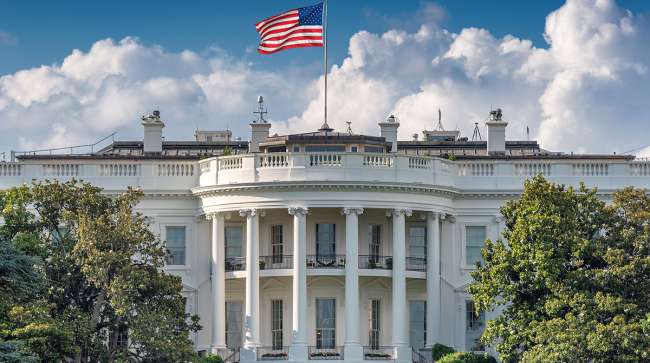The White House is proposing nearly $27 billion for the Department of Transportation’s discretionary budget in fiscal 2026. (lucky-photographer/Getty Images)
The Department of Transportation would realize a series of updates to freight infrastructure and supply chain initiatives under a fiscal 2026 budget request lawmakers say is short on specifics.
The White House this month produced for Congress a budgetary overview for the upcoming fiscal year. Calling it a “skinny” budget, the Office of Management and Budget proposes Congress approve significant changes specific to domestic energy, environmental and economic policies.
Congressional funding leaders acknowledged the Trump White House’s budget document without expressing their full endorsement.
As part of the request, port infrastructure operations would experience an increase of nearly $600 million to enhance supply chain connectivity. Funding for a prominent grants program would be increased by more than $700 million to assist state agencies with freight projects of regional significance. The Federal Aviation Administration’s budget for expanding air traffic control operations also would increase — a response to ongoing disruptions to the nation’s aviation system.
.@SecDuffy: The Biden Administration spent $1.2T on “infrastructure” in America — none of it went to fix the air traffic control system, which is a crumbling infrastructure, a key infrastructure… we don’t pass problems off to the next administration. We actually fix problems. pic.twitter.com/JZaTlSdviv
— Rapid Response 47 (@RapidResponse47) May 9, 2025
Overall, the White House proposes nearly $27 billion for the department’s discretionary budget in fiscal 2026. The White House also took aim at Biden-era initiatives designed to address climate change. As part of the budget’s “Ending the Green New Scam” section, the White House proposes reductions to “costly technologies that burden ratepayers and consumers.” Specifically, it recommends Congress terminate “handouts to electric vehicle (EV) and battery makers.” It also calls for canceling $6 billion for a nationwide electric vehicle charging station program.
“The Biden administration spent more than three years implementing these programs, but built only a small number of chargers because it prioritized overregulating and ‘climate justice’ goals. [Electric vehicle] chargers should be built just like gas stations: with private sector resources disciplined by market forces,” the “skinny” document explained.
Seth Clevenger and Mike Senatore dive into the Transport Topics Top 100 list of the largest logistics companies. They address trade challenges, mergers, sector trends and more. Tune in above or by going to RoadSigns.ttnews.com.
The Office of Management and Budget noted the request would reduce nondefense discretionary spending by $163 billion or 23% from last year’s enacted level.
“For decades, the biggest complaint about the federal budget was wasteful spending and bloated bureaucracy. But over the last four years, government spending aggressively turned against the American people and trillions of our dollars were used to fund cultural Marxism, radical Green New Scams, and even our own invasion,” OMB Director Russ Vought said May 2 in reference to progressive Democrats’ “Green New Deal” policy proposal.
“At this critical moment, we need a historic budget — one that ends the funding of our decline, puts Americans first and delivers unprecedented support to our military and homeland security,” Vought said. “The president’s budget does all of that.”
On Capitol Hill, senior members of the funding committees — already tasked with producing a separate White House-backed budget — raised concerns about the size and timing of the “skinny” budget.

Key details are missing from the White House’s budget request, Collins says.( Al Drago/Bloomberg News)
“The president’s budget request is simply one step in the annual budget process. This request has come to Congress late, and key details still remain outstanding,” said Senate Appropriations Committee Chairwoman Susan Collins (R-Maine).
Trump’s Cabinet has begun defending the fiscal 2026 budget request before the Appropriations committees. Treasury Secretary Scott Bessent testified before the House panel May 6, and Transportation Secretary Sean Duffy is likely to appear on the Hill as early as this month.
“With Congress and the White House working hand in hand, we expect to see even more positive results over the next few months,” Bessent said. “Key to expanding economic opportunity for all Americans is making the Trump tax cuts permanent.”
Separate from Congress’ annual appropriations assignment, Republican leaders are drafting a procedural tax and budget bill. This reconciliation measure — requiring simple majorities for passage — would include policies on border security, military readiness, the social safety net, domestic energy, supply chain connectivity and extending the Trump-era 2017 tax cuts.







